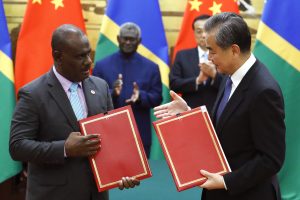The diplomatic relationship between the Solomon Islands and China, established five years ago, has profoundly influenced the country’s development, economy, and political landscape.
This anniversary presents an opportune time to examine the trajectory of this relationship, key events, and the impact on the Solomon Islands while also considering recent political changes and the broader implications for the country’s future.
The Solomon Islands, located in the southwestern Pacific Ocean, is an archipelago nation consisting of six major islands and over 900 smaller ones. The country’s evolution has been shaped by its geographical isolation, limited infrastructure, and reliance on natural resources. The national economy is primarily based on agriculture, forestry, and fishing, with these sectors providing livelihoods for a significant portion of the population. However, the country faces challenges such as limited access to international markets, vulnerability to natural disasters, and political instability, all of which have impeded consistent economic growth and development.
Historical Relationship With Taiwan
From 1983 until 2019, the Solomon Islands maintained diplomatic relations with the Republic of China, also known as Taiwan.
During this period, Taiwan provided substantial aid to the Solomon Islands, including infrastructure projects, educational scholarships, and medical assistance. This relationship was part of Taiwan’s broader strategy to maintain international recognition in the face of the People’s Republic of China’s growing global influence. The Solomon Islands-Taiwan relationship was characterized by frequent high-level visits and bilateral cooperation, emphasizing the significance of the partnership for both countries.
However, as China’s global influence expanded, Taiwan’s diplomatic position weakened. By September 2019, the Solomon Islands decided to sever its diplomatic ties with Taiwan and establish formal relations with China. This shift aligned with a broader trend among Pacific nations re-evaluating their diplomatic ties with Taiwan in favor of China. Kiribati dropped Taiwan to establish a relationship with China the same month the Solomon Islands did; Nauru followed suit in January 2024.
The relationship with Taiwan had been beneficial for the Solomon Islands in several ways. Taiwan’s support included financial aid for development projects, technical assistance in agriculture and fisheries, and health services, particularly in rural and remote areas. This aid helped address some of the Solomon Islands’ critical needs and contributed to the country’s development efforts. However, Taiwan’s resources and influence were limited compared to those of an increasingly powerful and globally dominant China.

































